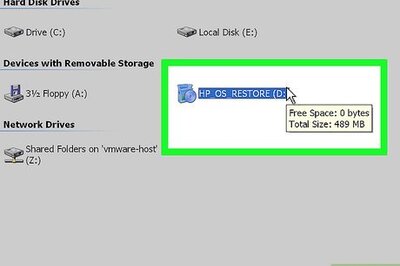
views
New Delhi: As Bharatiya Janata Party (BJP) patriarch LK Advani embarks on yet another rath yatra, the contrast with his first one in 1990 cannot be starker. When Advani started his all-India tour during his first yatra on September 25, 1990 from Somnath in Gujarat to drum up support for the construction of a Ram Temple at Ayodhya in Uttar Pradesh, his party was just one of the many Opposition parties in India trying to challenge the Congress, the country was yet to witness the liberalisation of its economy, the USSR still existed and the Cold War was very much on.
But 21 years later the world and India are well and truly into 21st century even as Advani seems to be stuck in the late 1980s and early 90s. His decision to start the Jan Chetna Yatra against corruption is an afterthought and a reaction to Anna Hazare's hugely popular anti-corruption movement, which forced the Congress-led United Progressive Alliance to commit to a strong Lokpal Bill. The yatra is simply trying to try to capitalise on the strong anti-corruption mood in the country and the anger against the UPA in general and the Congress in particular.
Advani perhaps believes that just as his Somnath-Ayodhya Ram Rath Yatra catapulted the BJP to the centrestage of national politics and helped it emerge as an alternative to the Congress, the Jan Chetna Yatra will propel his party to power at the Centre.
His critics have blamed Advani for fanning the communal embers and using the divisive issue of Ram Janambhoomi-Babri Masjid to gain political mileage and it has been an albatross around his neck since then. The Ayodhya movement which gained momentum following his Rath Yatra resulted in the destruction of the Babri Masjid in Ayodhya and triggered massive communal violence in several cities, towns and villages.
The BJP leader's choice of the place to start his Jan Chetna Yatra is also surprising. Advani chose Sitab Diara, a village in Saran district of Bihar where Lok Nayak Jaya Prakash Narayan was born, to start his yatra in contrast to Somnath in Gujarat for his first tour.
As Bihar Chief Minister Nitish Kumar flagged off his Jan Chetna Yatra, his bitter rival and Rashtriya Janata Dal chief Lalu Prasad called Advani's move an insult to the state. After all it was Lalu who as the chief minister of Bihar on October 23, 1990 got Advani arrested at Samastipur and emerged as the hero for the minority community and the secular bloc. The men tasked with arresting Advani were the current Union Home Secretary Raj Kumar Singh, who ironically is now responsible for ensuring the BJP leader's security, and Indian Police Service (IPS) officer Rameshwar Oraon.
Nitish Kumar was Lalu's comrade-in-arms when Advani was arrested and he used the incident to show off his secular credentials and rule Bihar for 15 years.
Nitish Kumar fell out with Lalu after a few years and is now credited with turning around Bihar, which had become infamous as a byword for poor law and order and corruption under the RJD rule. Advani's Bihar tour under Nitish Kumar's rule will also be less bumpy than it was in 1990 when the roads in the state were almost non-existent.
It is not only Bihar that has changed since the 1980s and 1990s, but the entire country. Economic liberalisation has opened the world for India and the country is no longer spoken of as just another third world nation, but as a rising power.
Today, the biggest multinational companies have their offices in India and the country has become the hub of Information Technology and related services. Big internationals brands have joined the Indian success story and fuelled aspiration of the ever-burgeoning middle class that has seen its numbers swell thanks to rising income due to economic progress.
The talks at colleges and educational institutes are now not about the local politics or the fate of the Ayodhya movement, but about campus recruitments and the possible salary packages.
The Ambassador, a symbol of the tightly controlled Indian economy is almost on the verge of extinction, and the Maruti Suzukis are facing stiff competition from several global car makers. All economic and social indicators are much better than they were in the early 1990s.
Economic liberalisation, which started in 1991, has resulted in an entirely new India which does not want to carry on the baggage of the past. It wants rapid development, massive investments to improve the crumbling infrastructure, more and better quality educational institutions and a clean political system.
The India of today is concerned about corruption as the massive support to Anna Hazare showed, but it wants a decisive decision and strong action to tackle it. Mere rhetoric as Advani indulged before embarking on his yatra will be of no help to eradicate corruption and black money.
He should take a lesson from Nitish Kumar who has shown that a politician need not be loud mouth make his point but simply needs to deliver the goods for everyone to take notice. After delivering in a state like Bihar, which was given up as good as having reached a point of no return, Nitish Kumar has emerged as an example on what it takes to bring the language of economic as well as social development back into political discourse.
However, it seems that Advani and the BJP believe that going on another yatra will pull out the party from the morass that it has been in since losing the 2004 Lok Sabha elections which all and sundry believed it was going to sweep riding on the India Shining slogan.
What the eternal yatri of Indian politics needs to do is not only outline a clear policy on the corruption issue but also come up with a roadmap about economy as well, which has been hit by various scandals and resultant inertia in the government machinery.
The BJP has been speaking in different voices over its plan to tackle corruption. While Anna Hazare claims that BJP President Nitin Gadkari has assured him full support on the Jan Lokpal Bill; Leader of Opposition in the Rajya Sabha, Arun Jaitley, has voiced reservations over several clauses in Team Anna’s Bill.
It remains to be seen how Advani will bridge this divide even as his yatra has resulted in some of his own party leaders question that need for the 83-year-old to start his tour and see in it his desire to reignite his candidature for the post of the prime minister.
While his yatra may get him prime time space on news channels and full page coverage in the print media, it is unlikely to make a huge dent in his or his party’s fortunes.
Crtiticising the government of the day is the legitimate constitutional right of the Opposition, but more important than that is giving the people of the country a clear picture of what it intends to do to bring a change and provide a better tomorrow. If Advani succeeds in doing so, he will be doing a great service to the nation otherwise the Jan Chetna Yatra will become just another footnote in the history of Indian politics.


















Comments
0 comment